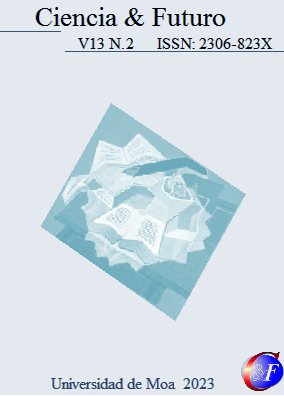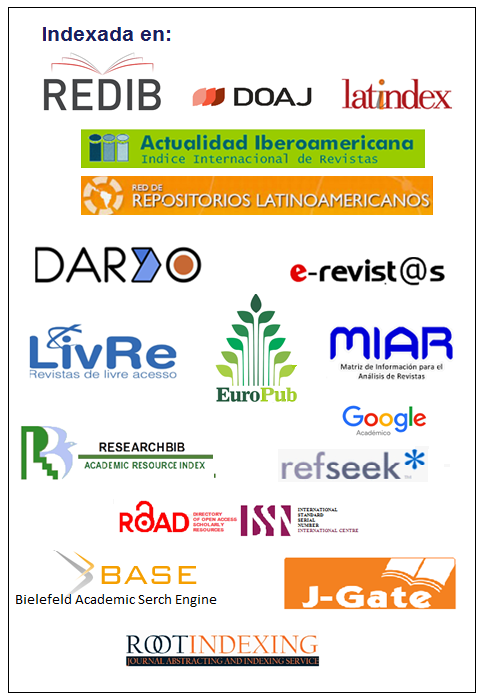Psychosocial and neuropsychological alterations of addictive behavior disorder with and without substances in adults
Keywords:
Substance use disorder, addictive behavior disorders, gaming disorder, video game use disorderAbstract
The most frequent pharmacological, psychological and recently cognitive treatments for substance abuse disorder and non-substance abuse were addressed, as well as the different neuropsychological findings related to this pathology in the adult population. The consequences of both moderate and chronic intake affect all spheres of the human being, in addition to having long-term structural, behavioural, psychological and cognitive consequences, many of them irreversible.Downloads
References
ALLAMI, Y., HODGINS, D., YOUNG, M., BRUNELLE, N., CURRIE, S., DUFOUR, M., FLORES, M. C. & NADEAU, L. (2021). A meta-analysis of problem gambling risk factors in the general adult population. Addiction (Abingdon, England), 116(11), 2968.
AMERICAN PSYCHIATRIC ASSOCIATION (2013). Diagnostic and statistical manual of mental disorders: DSM-5. American psychiatric association 5(5).
BALASANOVA, A. (2020). ¿Qué es el trastorno por consumo de sustancias (adicción)? American Psychiatric Association. Disponible en: https://www.psychiatry.org/Patients-Families/Addiction-Substance-Use-Disorders/what-is-a-substance-use-disorder.
BRONFENBRENNER, U. (1987). La ecología el desarrollo humano: experimentos en entornos naturales y diseñados. Barcelona: Paidós.
CARMONA, M. & PEÑA, K. (2017). Factores psicosociales asociados al consumo y adicción a sustancias psicoactivas. Revista Electrónica de Psicología Iztacala, 20(1). 139-167. Disponible en: www.revistas.unam.mx/index.php/repiwww.iztacala. unam.mx/carreras/psicologia/psicli.
CHERON, J. & KERCHOVE D’EXAERDE, A. DE. (2021). Drug addiction: from bench to bedside. Translational Psychiatry 11(1), 1–14. https://doi.org/10.1038/s41398-021-01542-0
DARCQ, E. & KIEFFER, B. (2018). Opioid receptors: drivers to addiction? Nature Reviews Neuroscience. 19(8), 499–514. https://doi.org/10.1038/s41583-018-0028-x
DEL PINO-GUTIÉRREZ, A., GRANERO, R., FERNÁNDEZ, F., MENA, T., MESTRE, G., GÓMEZ, M., MORAGAS, L., AYMAMÍ, N., GIROUX, I., GRALL, M., SAUVAGET, A., CODINA, E., VINTRÓ, C., LOZANO, M., AGÜERA, Z., SÁNCHEZ, J., CASALÉ, G., BAENAS, I., SÁNCHEZ, I., … JIMÉNEZ, S. (2022). Gambling activity in the old-age general population. Ageing & Society, 42(12), 2757–2783. https://doi.org/10.1017/S0144686X21000258
EGERVARI, G., SICILIANO, C. A., WHITELEY, E. L. & RON, D. (2021). Alcohol and the brain: from genes to circuits. Trends in Neurosciences, 44(12), 1004. https://doi.org/10.1016/J.TINS.2021.09.006
FATHALLA, M. F. & FATHALLA, M. M. (2008). Guía práctica de investigación en salud. OPS, Of. Regional de la Organización Mundial para la Salud. 620, 135-156.
FERLAND, J. M. N. Y HURD, Y. L. (2020). Deconstructing the neurobiology of cannabis use disorder. Nature Neuroscience, 23(5), 600–610. Disponible en: https://pubmed.ncbi.nlm.nih.gov/32251385/.
FUENTES, Y., MORENO, J. C. & LÓPEZ, G. R. (2017). Executive functions in alcohol-dependent patients. Revista del Hospital Psiquiátrico de la Habana, 13(3). Disponible en: https://www.medigraphic.com/pdfs/revhospsihab/hph-2016/hph163f.pdf.
GARCÍA, G., GARCÍA, O. & SECADES, R. (2011). Neuropsicología y adicción a drogas. Papeles del psicólogo, 32(2), 159-165. Disponible en: https://www.papelesdelpsicologo.es/pdf/1950.pdf.
GRANERO, R., FERNÁNDEZ, F., VALERO, S., DEL PINO-GTUTIÉRREZ, A., MESTRE, G., BAENAS, I., CONTALDO, S. F., GÓMEZ, M., AYMAMÍ, N., MORAGAS, L., VINTRÓ, C., MENA, T., VALENCIANO, E., MORA, B., MENCHÓN, J. M. & JIMÉNEZ, S. (2020). The influence of chronological age on cognitive biases and impulsivity levels in male patients with gambling disorder. Journal of Behavioral Addictions, 9(2), 383. Disponible en: https://psycnet.apa.org/record/2020-76226-016.
INSULZA, J. M. (2014). El problema de las drogas en las Américas. Reflexiones sobre el desarrollo en América Latina y el Caribe: conferencias magistrales 2013-2014. Santiago: CEPAL, 2014. LC/G. 2610. p. 31-40.
KOOB, G. & VOLKOW, N. (2009). Neurocircuitry of Addiction. Neuropsychopharmacology, 35(1), 217–238. https://doi.org/10.1038/npp.2009.110
KUSS, D. J., PONTES, H. M., & GRIFFITHS, M. D. (2018). Neurobiological correlates in internet gaming disorder: A systematic literature review. Frontiers in Psychiatry, 9, 166. https://doi.org/10.3389/FPSYT.2018.00166/XML/NLM
MACLAREN, V., MCDONALD, V., HOLLETT, K. B. & HARRIS, N. (2022). Gambling Associated Risk-taking Behaviors Correlate with Emotional Regulation and the Iowa Gambling Task but not Wisconsin Card Sorting. Journal of Gambling Studies, 1(13). https://doi.org/10.1007/S10899-022-10157-Z/TABLES/3
MALLORQUÍ, N., VINTRÓ, C., VERDEJO, A., GRANERO, R., FERNÁNDEZ, F., MAGAÑA, P., MENA, T., AYMAMÍ, N., GÓMEZ, M., DEL PINO, A., MESTRE, G., MENCHÓN, J. M. & JIMÉNEZ, S. (2019). Impulsivity and cognitive distortions in different clinical phenotypes of gambling disorder: Profiles and longitudinal prediction of treatment outcomes. European Psychiatry, 61, 9–16. Disponible en: https://pubmed.ncbi.nlm.nih.gov/31255958/.
NIDA. (2022). Treatment and Recovery. Retrieved from Disponible en: https://nida.nih.gov/publications/drugs-brains-behavior-science-addiction/treatment-recovery on 2023, February 12.
OFICINA DE LAS NACIONES UNIDAS CONTRA LA DROGA Y EL DELITO (2022). Informe mundial contra las drogas. Disponible en: www.unodc.org/res/wdr2022/MS/WDR22_Booklet_2.pdf.
ORGANIZACIÓN PANAMERICANA DE LA SALUD (2011). La prueba de detección de consumo de alcohol, tabaco y sustancias (ASSIST). Manual para uso en la atención primaria. OPS, Of. Regional de la Organización Mundial para la Salud.
POTENZA, M. N., BALODIS, I. M., DEREVENSKY, J., GRANT, J. E., PETRY, N. M., VERDEJO, A. & YIP, S. W. (2019). Gambling disorder. Nature Reviews Disease Primers, 5(1), 1–21. https://doi.org/10.1038/S41572-019-0099-7
REZAPOUR, T., HATAMI, J., FARHOUDIAN, A., SOFUOGLU, M., NOROOZI, A., DANESHMAND, R., SAMIEI, A. & EKHTIARI, H. (2015). Neuro Cognitive Rehabilitation for Disease of Addiction (NECOREDA) Program: From Development to Trial. Basic and clinical neuroscience, 6(4), 291–298.
STEVENS, M. W. R., DORSTYN, D., DELFABBRO, P. H. & KING, D. L. (2021). Global prevalence of gaming disorder: A systematic review and meta-analysis. Australian and New Zealand Journal of Psychiatry, 55(6), 553–568.
STRANG, J., VOLKOW, N. D., DEGENHARDT, L., HICKMAN, M., JOHNSON, K., KOOB, G. F., MARSHALL, B. D. L., TYNDALL, M., & WALSH, S. L. (2020). Opioid use disorder. Nature Reviews Disease Primers, 6(1), 1–28. https://doi.org/10.1038/s41572-019-0137-5
VACCARO, A. G. & POTENZA, M. N. (2020). Neurobiological Foundations of Behavioral Addictions. The Cambridge Handbook of Substance and Behavioral Addictions, 136–151. https://doi.org/10.1017/9781108632591.016
VALLEJO, F. (2019). Assessment of the executive function in cocaine paste dependent patients using a neuropsychological battery. Psykhe, 28(1), 1–17. https://doi.org/10.7764/psykhe.28.1.1111
VAN TIMMEREN, T., DAAMS, J. G., VAN HOLST, R. J., & GOUDRIAAN, A. E. (2018). Compulsivity-related neurocognitive performance deficits in gambling disorder: A systematic review and meta-analysis. Neuroscience & Biobehavioral Reviews, 84, 204–217. https://doi.org/10.1016/J.NEUBIOREV.2017.11.022.
VERDEJO, A. (2016). Evaluación neuropsicológica en adicciones: guía clínica. Acción Psicológica, 13(1), 1-6. https://doi.org/10.5944/ap.13.1.17392.
VERDEJO, A., GARCÍA, G. & DOM, G. (2019). Cognition and addiction. Dialogues in Clinical Neuroscience, 21(3), 281–290. https://doi.org/10.31887/DCNS.2019.21.3/gdom
WOLFSCHLAG, M. & HÅKANSSON, A. (2023). Drug-Induced Gambling Disorder: Epidemiology, Neurobiology, and Management. Pharmaceutical Medicine, 37(1), 37–52. https://doi.org/10.1007/S40290-022-00453-9.
ZOU, Z., WANG, H., D’ OLEIRE UQUILLAS, F., WANG, X., DING, J., & CHEN, H. (2017). Definition of Substance and Non-substance Addiction. Substance and Non-Substance Addiction, 21–41. doi:10.1007/978-981-10-5562-1_2.
Published
How to Cite
Issue
Section

This work is licensed under a Creative Commons Attribution-NonCommercial 4.0 International License.
Esta obra está bajo una Licencia Creative Commons Reconocimiento-NoComercial 4.0 Internacional
La Revista Ciencia & Futuro es una revista de acceso abierto, todo el contenido está disponible gratuitamente sin cargo para el usuario o su institución. Los usuarios pueden leer, descargar, copiar, distribuir, imprimir, buscar o vincular los textos completos de los artículos, o utilizarlos para cualquier otro fin lícito, sin pedir permiso previo al editor o al autor. Todo lo anterior, de acuerdo con la definición de BOAI de acceso abierto.
Los autores que publican en esta revista están de acuerdo con los siguientes términos: Licencia Creative Commons Atribución-NoComercial permite que el beneficiario de la licencia tenga el derecho de copiar, distribuir, exhibir y representar la obra y hacer obras derivadas para fines no comerciales siempre y cuando reconozca y cite la obra de la forma especificada por el autor o el licenciante. Los autores pueden establecer por separado acuerdos adicionales para la distribución no exclusiva de la versión de la obra publicada en la revista (por ejemplo, situarlo en un repositorio institucional o publicarlo en un libro), con un reconocimiento de su publicación inicial en esta revista. Se permite y se anima a los autores a difundir sus trabajos electrónicamente (por ejemplo, en repositorios institucionales o en su propio sitio web) antes y durante el proceso de envío, ya que puede dar lugar a intercambios productivos, así como a una citación más temprana y mayor de los trabajos publicados (Véase The Effect of Open Access) (en inglés). Lo anterior debe realizarse siempre sobre el artículo ya publicado por Ciencia & Futuro.
Los autores mantienen el control sobre la integridad de sus trabajos y el derecho a ser adecuadamente reconocidos y citados.
A los editores se les otorgan derechos no exclusivos para publicar y distribuir.




